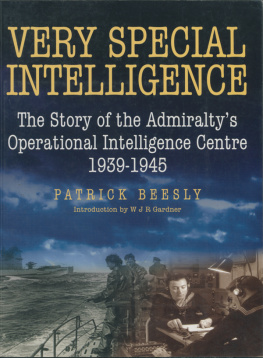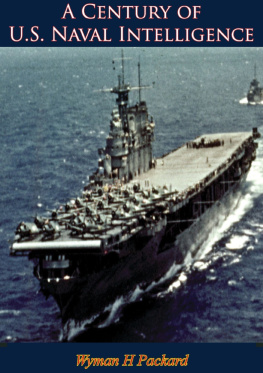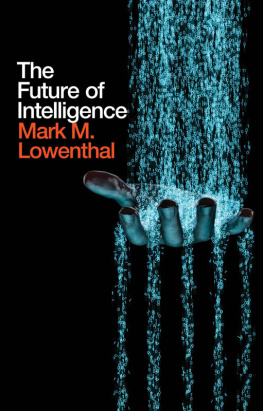
VERY SPECIAL INTELLIGENCE
Patrick Beesly served in the Naval Intelligence
Division of the Admiralty, in Operational
Intelligence Centre, from 19401945.
W J R Gardner and Ralph Erskine are both
leading naval historians and the authors of
numerous books and articles.
VERY SPECIAL INTELLIGENCE
The Story of the Admiraltys
Operational Intelligence Centre
19391945
PATRICK BEESLY
Introduction by W J R Gardner
New Afterword by Ralph Erskine
Frontline Books
Published in this format in 2015 by
Frontline Books
an imprint of
Pen & Sword Books Ltd
47 Church Street, Barnsley, S70 2AS
www.frontline-books.com
Copyright Patrick Beesly 1977
Introduction W J R Gardner 2000
Afterword Ralph Erskine 2000
Bibliography W J R Gardiner & Ralph Erskine 2000
First published in 1977 by Hamish Hamilton
Digital edition published by Frontline Books.
British Library Cataloguing in Publication Data
Beesly, Patrick, 1913
Very special intelligence: the story of the Admiraltys
Operational Intelligence Centre, 19391945
1.Great Britain. Naval Intelligence Division.. Operational
Intelligence Centre History
2.World War, 19391945
Secret service Great Britain
I.Title
940.548641
ISBN-10: 1861762771
ISBN-13: 9781784381561
All rights reserved. No part of this publication may be reproduced or transmitted in any form or by any means, electronic or mechanical, including photocopying, recording, or any information storage and retrieval system, without prior permission in writing of both the copyright owner and the above publisher.
Printed and bound in Great Britain by CPD (Wales), Ebbw Vale
CONTENTS
2THE FIRST TWELVE MONTHS.
A LEAN TIME
3OCTOBER 1940MAY 1941.
SIGNS OF IMPROVEMENT
6JUNEDECEMBER 1941. SPECIAL
INTELLIGENCE AT LAST
7JANUARYJULY 1942. OPERATION
PAUKENSCHLAG AND THE GREAT BLACK-OUT
ILLUSTRATIONS
Between pages 136 and 137
THE FIRST edition of Very Special Intelligence was published in 1977 following a series of articles in The Naval Review by Patrick Beesly. It rapidly gained an audience among two main groups of people: those who had participated in World War II, and students of the period who had not necessarily been players in that global drama. A new edition of this book will again capture the attention of those original readersthe former of which are now sadly much diminishedbut will also educate a new generation. There are, perhaps, three dimensions we should stress in relation to the original work: the historical ambience into which it fell, the strategic context of the organisation described by Beesly in the book, and the impact of subsequent writing on the subject.
For many years after 1945, historical literature was dominated by two types of book: the official history of events, and the reminiscences of participants. This was particularly true for the Battle of the Atlantic, the shorthand term for the long, complex, sometimes bitter struggle between Grossadmiral Karl Dnitzs U-boats on one hand and groups of merchant ships and escorts, generally sailing in convoy, on the other. This does not form the entire subject of Beeslys book, but it does occupy the largest part and it was also incidentally where Beesly himself was employed for much of the war. Some of the other accounts were very good but had obvious limitations. The official naval history, The War at Sea by Captain S. W. Roskill, was broad in scope and generally balanced. However, the intelligence side was barely covered at all and there was one very significant, and quite deliberate, omission: Ultra. As Beesly and others have pointed out, this is not really the correct term for the product of the codebreaking intelligence carried out at Bletchley Park and elsewhere, it was merely a marking applied to some of the decrypted signal-derived intelligence, to indicate their very great sensitivity and the great need for care in their handling. However, Ultra has become, in both popular and scholarly accounts, a short-hand term for codebreaking, and its implied definition will be used throughout this piece.
Roskills omission is hardly surprising as his last volume was produced as early as 1961. Tantalisingly, the book contains at least one hint for the initiated that Roskill knew very well about Ultra, as indeed he did. But the gaps also meant that more than one generation of readers grew up with no knowledge of this factor. Stronger hints were given out by Roskills contemporaries. Ladislas Farragos The Tenth Fleet (1962) sailed pretty close to the wind and Ronald Seths The Fiercest Battle (1961) also gave a single indication. But perhaps the closest brush with open acknowledgement of Ultra came with Donald McLachlans Room 39: Naval Intelligence in Action (1968). It has to be said that McLachlan, a member like Beesly of the wartime Naval Intelligence Division (NID), did not just content himself with the odd veiled hint but actually discussed such subjects as cryptanalysis and Station Xone of the names for Bletchley Parkat some length. Moreover, McLachlan was granted access to certain official papers denied to Beesly when the latter was writing his biography of Admiral John Godfrey, Very Special Admiral, over ten years later. The strange thing is that McLachlans coverage drew very little attention and the truth behind Ultrahe did not use the word itselfremained hidden.
The great breakthrough came in 1974 with the publication of what was an initially successful and later controversial work, F. W. Winterbothams The Ultra Secret. Its success came about due to the revelation to the British public, and also to the world, of the scale of British effort and success in the attack on German coded communications during World War II. Winterbotham was not a cryptographic specialist, nor was he involved in all spheres of activity relating to decoding, but this did not stop him from writing about matters about which he understood incompletely then or later. The other difficulty with the work was the fact that it had been written at all. Many of Bletchley Parks inhabitants, who had faithfully kept its secrets for thirty years or more, experienced an understandable sense of betrayal, not least because Winterbothamas the author of a great publishing successwas presumably enjoying handsome royalties. Yet in the long term, the importance of The Ultra Secretlay neither in its public impact, nor in its unsympathetic response from participants, nor even in its manifest inaccuracies, but in its very existence; its telling of the achievement of Ultra and the sanction it gave to whole new wave of literature on the subject. Very Special Intelligence, appearing in 1977, was on the leading edge of this.
What Beesly describes is the Operational Intelligence Centre (OIC) of the Naval Intelligence Division of the Admiralty. He wrote from a background of considerable knowledge, having worked in two different capacities in the organisation. In order to appreciate the OIC properly it is useful to consider the place of this entity in both the structure of the Royal Navy in World War II, as well as its part in operations. Much of this is covered in Very Special Intelligence, but not necessarily brought together at the outset. Thus, it can be considered now.
Next page







